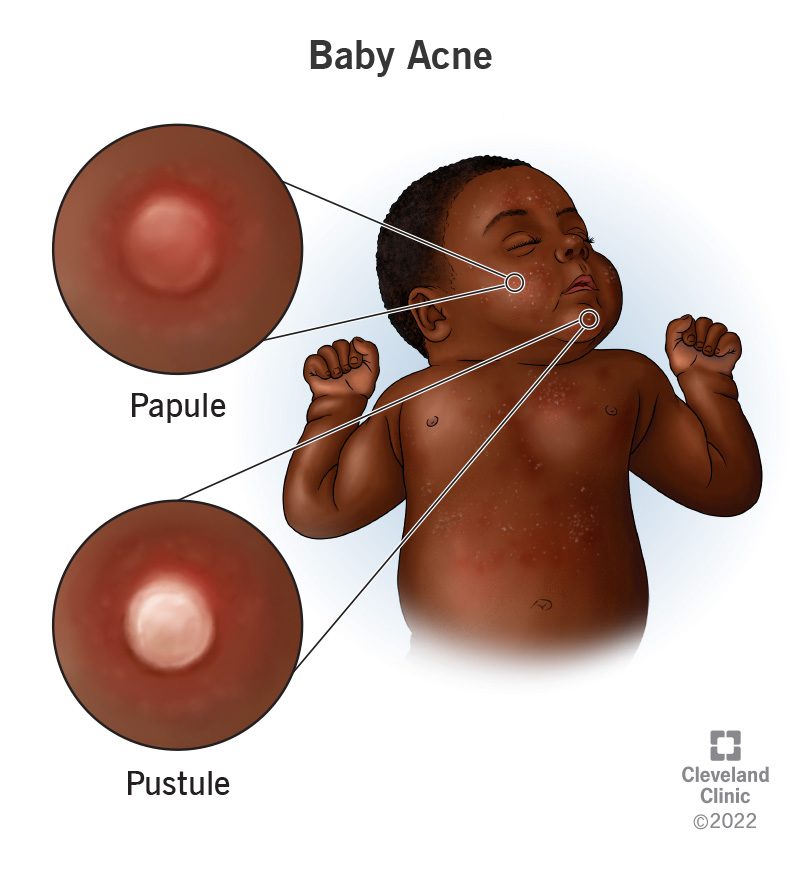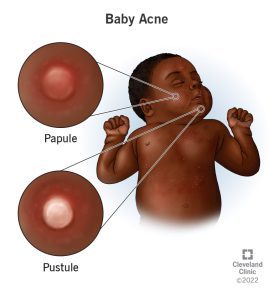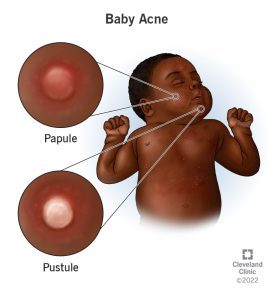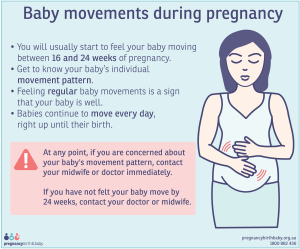Baby acne treatments include gentle cleansing, avoiding harsh chemicals, and keeping the affected area clean and dry. Babies commonly develop acne within the first few weeks of life due to maternal hormones.
While baby acne usually resolves on its own and does not require treatment, parents can gently cleanse the affected area with mild baby soap and water. It is crucial to avoid using harsh chemicals or scrubbing the baby’s skin vigorously.
Keeping the affected area clean and dry can also help manage baby acne. If the acne persists or seems severe, consult a pediatrician for further guidance and treatment options.
Common Causes Of Baby Acne
Baby acne can occur due to hormonal changes and is a common skin condition among newborns. However, there are various effective treatments available to help alleviate and manage baby acne.
Common Causes of Baby Acne Baby acne, also known as neonatal acne, is a common condition among newborns, typically appearing within the first few weeks after birth. It can be distressing for parents, but it’s usually harmless and tends to clear up on its own.
Understanding the common causes of baby acne can help to manage and prevent flare-ups, ensuring your little one’s skin stays smooth and clear. Hormonal Changes Hormonal changes are one of the primary contributors to baby acne.
During pregnancy, the mother’s hormones cross the placenta and can impact the baby’s oil glands, leading to an increase in sebum production. This can clog the pores and result in acne-like bumps on the baby’s skin. Irritation from Fabrics or Products Another common cause of baby acne is irritation from fabrics or products.
Babies have delicate skin, and exposure to rough fabrics, such as synthetic materials or abrasive clothing, can stimulate the development of acne. Similarly, using harsh soaps, lotions, or detergents can trigger skin irritation and exacerbate the condition. By staying mindful of these common causes, you can take proactive steps to minimize the risk of baby acne. Keep your baby’s skin clean and opt for gentle, hypoallergenic products.
Additionally, dress them in soft, breathable fabrics, and avoid exposing them to potential irritants. Understanding the underlying causes of baby acne empowers you to make informed choices that promote your baby’s skin health and overall well-being. By implementing simple preventive measures and providing a caring environment for your little one, you can help them navigate through this transient condition with ease and comfort.
Identifying Acne
When it comes to caring for your baby’s delicate skin, it’s important to be aware of any issues that may arise. Baby acne is a common skin condition that many newborns experience. It typically appears as small, red bumps or pimples on the baby’s face, often on the cheeks, nose, and forehead. While it may be concerning for parents to see their baby’s face covered in acne, it is usually harmless and will go away on its own within a few weeks or months. Identifying baby acne is the first step in determining how to treat and manage this common condition.
Symptoms To Look For
In order to accurately identify baby acne, it’s important to be aware of the common symptoms to look for. These symptoms include:
- Small red bumps or pimples on the baby’s face
- Bumps may have a white or yellowish center
- Bumps may appear inflamed or irritated
- Acne may be more pronounced after the baby feeds or becomes upset
- No other symptoms such as fever or fussiness
Distinguishing Baby Acne From Other Skin Conditions
While baby acne can have similar appearances to other skin conditions, it’s important to distinguish it from other issues in order to provide the appropriate treatment. Some conditions that baby acne may be mistaken for include:
| Condition | Distinguishing Factors |
|---|---|
| Milia | Small, white bumps on the skin surface |
| Eczema | Dry, itchy, and irritated patches of skin |
| Heat rash | Red bumps or blisters caused by sweat ducts becoming blocked |
By observing the specific characteristics of the bumps or rashes on your baby’s skin, it can help you distinguish baby acne from these other conditions. However, if you are unsure, it’s always best to consult with your pediatrician for a professional diagnosis.
Baby Acne Treatments
Baby acne can be distressing for parents, but gentle skincare is the key. Using fragrance-free products and avoiding scrubbing can help clear up the acne. Consulting with a pediatrician is important to determine the best treatment for your baby’s delicate skin.
Baby acne, also known as neonatal acne, is a common skin condition that affects many newborns. While it typically resolves on its own within a few weeks or months, parents often seek ways to alleviate their baby’s discomfort. Gentle Cleansing, Avoiding Harsh Products, Natural Remedies, and Consulting a Pediatrician are crucial aspects to consider when treating baby acne.
Gentle Cleansing
Use a mild, fragrance-free baby cleanser to gently cleanse your baby’s skin, without scrubbing or using harsh products. Avoid excessive bathing which can exacerbate the condition.
Avoiding Harsh Products
Steer clear of harsh soaps and lotions that may contain irritants or heavy fragrances. Choose non-comedogenic skincare products to prevent clogging pores.
Natural Remedies
Consider using natural remedies such as breast milk or coconut oil. Both have anti-inflammatory properties that can help soothe and heal the affected skin.
Consulting A Pediatrician
If baby acne persists or seems severe, it’s important to seek professional advice from a pediatrician. They can provide expert guidance and recommend appropriate treatments for your baby’s specific condition. Baby acne can be distressing for parents, but by implementing gentle skincare practices and seeking medical advice when necessary, it is manageable and typically resolves on its own.
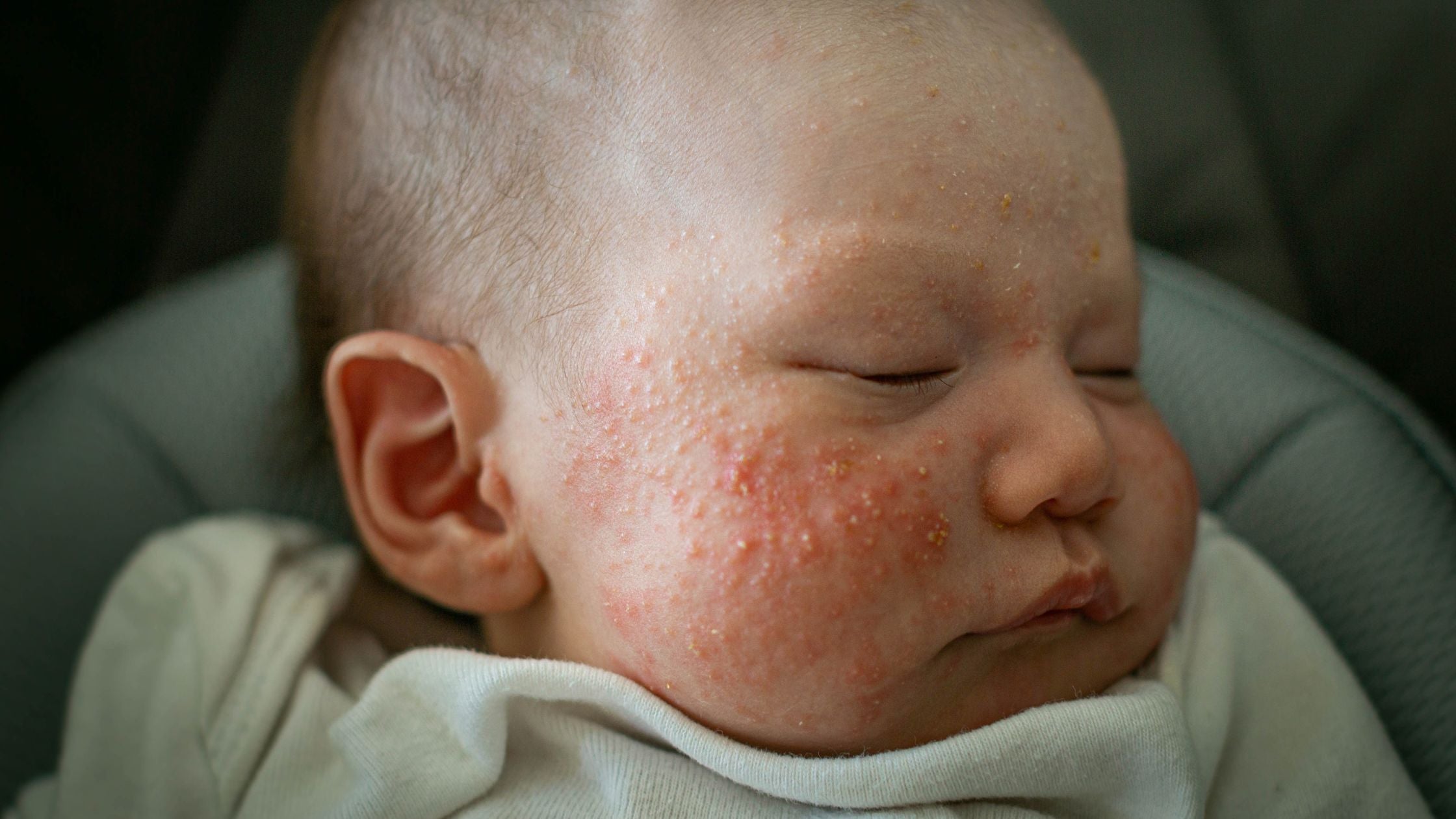
Preventing Baby Acne
Baby acne is a common skin condition that affects many newborns. While it typically resolves on its own within a few weeks, there are steps you can take to prevent and minimize the occurrence of baby acne. By choosing the right products, keeping your baby’s skin clean, and avoiding over washing, you can help keep your little one’s skin healthy and clear. Let’s explore these preventative measures in more detail.
Choosing The Right Products
When it comes to preventing baby acne, choosing the right products is essential. Opt for gentle, hypoallergenic skincare products specifically formulated for babies. Look for labels that indicate they are non-comedogenic, meaning they won’t clog your baby’s pores, and free from harsh chemicals, fragrances, and dyes.
It’s also important to avoid using any adult skincare products on your baby, as they may contain ingredients that can be too harsh for their delicate skin. Stick to products specifically designed for infants, and always read the labels to ensure they are suitable for your baby’s age.
Keeping Baby’s Skin Clean
Maintaining proper hygiene is crucial in preventing baby acne. Gently cleanse your baby’s face using a mild baby cleanser and warm water. Avoid using rough washcloths or scrubbing too vigorously, as this can irritate the skin and worsen acne symptoms.
After cleansing, pat your baby’s face dry with a soft, clean towel. Remember to be gentle and avoid rubbing, as excessive friction can irritate the skin. Regularly change your baby’s bibs and clothing to prevent oils and food particles from coming into contact with their skin, which can contribute to the development of acne.
Avoiding Over washing
While cleanliness is important, over washing can actually exacerbate baby acne. Avoid the temptation to wash your baby’s face excessively, as this can strip their skin of natural oils and disrupt the skin’s delicate balance. Stick to washing your baby’s face once a day, unless instructed otherwise by your pediatrician.
Remember, baby acne is a temporary condition and will likely resolve on its own. By following these preventative measures, you can help keep your baby’s skin clean, healthy, and free from acne flare-ups. If you have any concerns or if your baby’s acne persists or worsens, it’s always best to consult with your pediatrician for guidance.
When To Seek Medical Advice
If your baby’s acne is persistent or severe, it’s crucial to consult a healthcare provider for proper evaluation and guidance.
Persistent Or Severe Baby Acne
- Continual presence or worsening of baby acne beyond the first few months
- Large or painful acne lesions on the baby’s skin
- Development of yellow crusts or pus-filled bumps
Concerning Symptoms To Watch For
- Increased redness and inflammation around the acne
- Spreading of the acne to other areas of the body
- Blister-like formations or oozing lesions
Managing Parental Stress
Managing Parental Stress:
Dealing with baby acne can be stressful for parents. It’s important to take care of your mental well-being to navigate through this phase effectively.
Understanding Baby Acne Is Common:
Baby acne is a common condition that affects many newborns. It usually appears on the face as small red bumps that can be concerning for parents.
Taking Care Of Your Mental Well-being:
- Understand that baby acne is temporary and usually resolves on its own.
- Seek support from family, friends, or healthcare professionals if you feel overwhelmed.
- Practice self-care by taking breaks, getting enough rest, and engaging in activities that help you relax.
| Tips for managing parental stress: |
|---|
| 1. Take deep breaths when feeling overwhelmed. |
| 2. Communicate your feelings with your partner or a close friend. |
| 3. Remember that it’s okay to ask for help. |
Remember, taking care of your mental well-being is essential in navigating the challenges of dealing with baby acne. Practice self-compassion and seek support when needed.
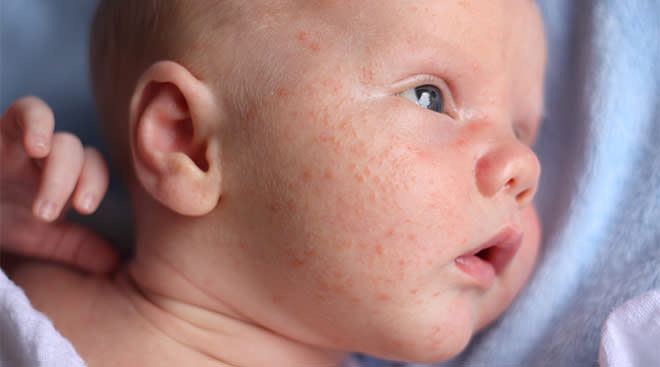
What Helps Baby Acne Go Away?
Gently wash baby’s face daily. Avoid harsh products. Pat skin dry and apply a gentle moisturizer. Avoid picking or squeezing. Consult pediatrician if concerned.
Can Breastmilk Help Baby Acne?
Yes, breastmilk can help baby acne due to its antibacterial and anti-inflammatory properties. Simply apply expressed breastmilk onto the affected areas.
What Triggers Baby Acne?
Baby acne is triggered by hormonal changes, specifically an increase in hormones passed from the mother to the baby. These hormones stimulate the oil glands in the baby’s skin, causing acne-like breakouts.
Will Aquaphor Help Baby Acne?
Yes, Aquaphor can help with baby acne by providing a protective barrier and promoting healing. It is safe and effective for treating mild cases. Regular use can help soothe irritation and prevent further flare-ups.
Conclusion
In sum, managing baby acne involves patience, gentle care, and seeking medical advice if needed. Consistent cleansing with mild products and avoiding harsh chemicals can aid in reducing the symptoms. Always consult with a pediatrician for a customized treatment plan and to address any concerns related to your baby’s skin health. ‘ baby acne treatments, baby acne treatments, baby acne treatments “

